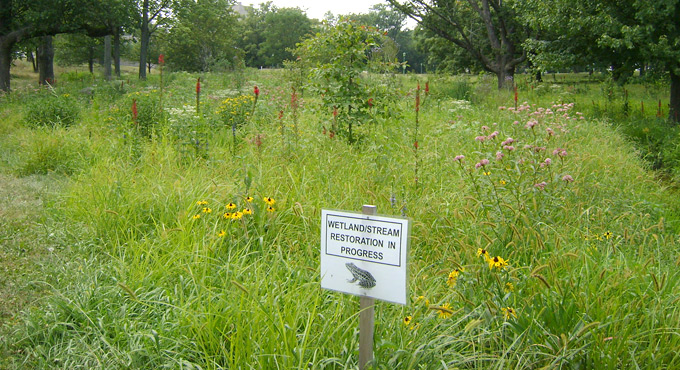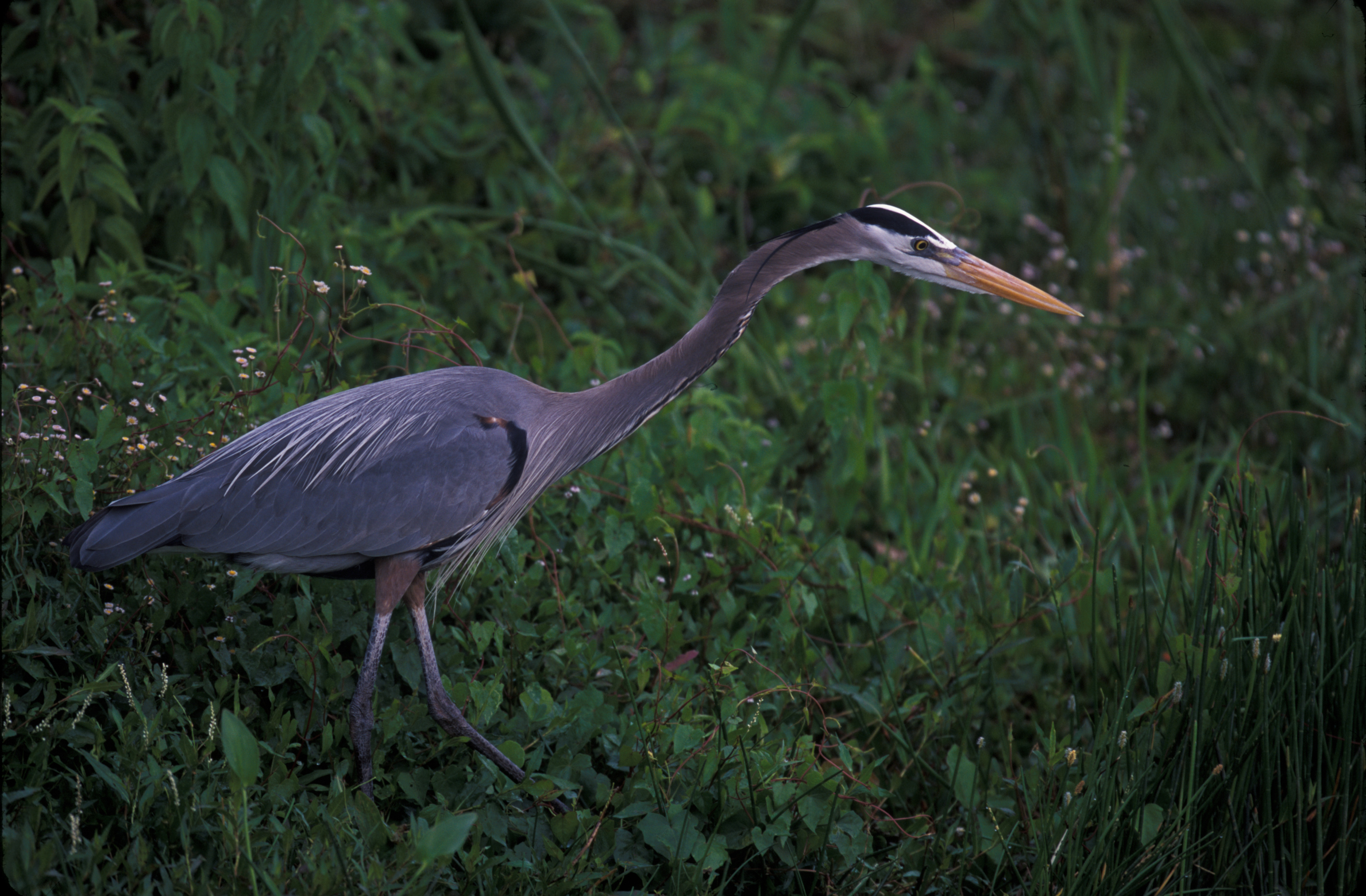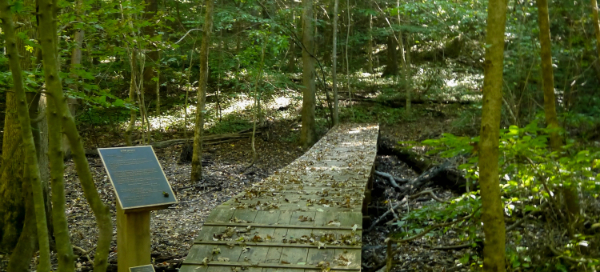A few years ago, I packed my bags and moved to Bloomington, Indiana for graduate school. An eager student, I couldn’t wait to start my classes, especially my first elective, a wetlands biology and restoration class with lab. I had very little experience studying and spending time in these unique ecosystems as most of the wetlands near my childhood home in Ohio were converted to agricultural lands long ago. And then, the weekend before classes began, I clumsily stepped off a relatively short wall and unceremoniously broke my left foot.
Most academic pursuits can still be pursued while wearing a monstrous boot to protect your healing bones, but the teacher warned me a wetlands lab was different. There’s no way around the fact that your feet WILL get wet. Worried, but not willing to miss out on the class I looked forward to the most, I hobbled forward.

(Wetland restoration project at Indiana University – Bloomington, photo by IU EHS)
From week one, the classroom sessions were engaging and fun. Wetlands are some of the most complex, impressive ecosystems on the planet and we all looked forward to exploring one close to campus at the end of that first week. I brainstormed different ways of protecting my foot and new shoe wear from the murky waters and came up with a solution fit for a poor, eager graduate student. Each lab, I would very carefully wrap my boot in no less than three heavy-duty garbage bags and secure them tightly to my pants with multiple rings of duct tape. Was it a classy solution? Not really, but it got the job done. My poor booted foot stayed mostly bone dry while my other merely booted foot became almost instantly soggy from the morass. Furthermore, I finished the class with high marks and a newfound love of wetlands.
Why again did I go through so much trouble and care so much about wetlands?

(Great Blue Heron, USFWS Public Domain)
Once widespread throughout the world, wetlands are rapidly vanishing. Scientists estimated that by the mid-1970s, 64% of wetlands in the US had disappeared. Before colonization, North Carolina had an estimated 11 million acres of wetlands. In 1996, North Carolina had only about 5.7 million acres, a 48% decrease. Frequently viewed as unproductive wastelands, wetlands are often drained, filled or converted to other purposes like agriculture and grazing, Wetland quality and productivity has also been majorly reduced by air and water pollution, excess nutrients, and water diversion through structures like dams and canals.
Why is this such an alarming trend and why should you care?
Here are a few good reasons:
• We need food. Humans around the world rely on food produced in association with wetlands. Rice, grown in wetland paddies, accounts for 20% of the world’s nutritional intake. Saltwater wetlands provide nursery habitat for most of the fish and shellfish that we eat and many of our game animals, especially birds, and found in association with wetland habitats.
• We need fresh water. Life on earth requires water, fresh water to be exact, and only about 1% of the world’s fresh water is accessible for human use. Wetlands often serve as groundwater discharge sites; maintaining base flow in streams and rivers; and supporting ponds and lakes. In some places, wetlands are very important in recharging groundwater supplies.
• We need clean water. Wetland sediments, plants, and marine life absorb pollutants from pesticides, industry and mining, including heavy metals and toxins; thereby removing the substances from the water supply.
• They protect us. Wetlands act like a giant sponge, soaking up excess water and reducing flood risks. Along the coast, wetlands create a protective barrier between communities and the sea’s destructive forces. Wetlands, especially peatlands, also store large amounts of carbon, an important benefit given the increasing impacts of climate change.
• Wildlife need wetlands. As highly productive ecosystems, wetlands can support a remarkable level of biodiversity. In fact, about 70% of the rare and endangered plants and animals in North Carolina are wetland dependent. Also known as “nature’s nurseries,” wetlands provide a rich, environment for the development of young amphibians, fish, birds, insects, and mammals.
Lastly, I think we all can benefit personally and as a society from spending time in wetlands. Many people have formed less than ideal opinions about wetlands without spending any measurable amount of time exploring them and considering their worth. A little education and interaction with something unfamiliar can go a long way in shaping one’s attitudes. Moreover, wetlands make great outdoor classrooms, engaging students young and old through sight, touch, sound, smell, and sometimes even taste! Wetlands can also provide an ideal location for both passive and active recreation such as hunting, paddling, and walking and from this blog post, we all now know the varied benefits of spending time in nature.

(Bridge through bottomland hardwood forest at Swift Creek Bluffs, by Erika Zambello)
Now that you’re as a big a fan of wetlands as me, I encourage you to visit one soon! If you didn’t get a chance to visit Swift Creek Bluffs as part of our TGI Hike Day series, take a trip out to this nature preserve located in Wake County which has several small wetland communities. Almost immediately after leaving the parking lot, you will most likely experience a soggy path leading to a rich bottomland forest. Occurring in the floodplain at the base of the bluffs, there are depressions in abandoned river channels on floodplains that hold standing water most of the year. Look overhead for overcup oaks and below for amphibians and maybe even fish among the pools. If you’re into plants (like me), look throughout the year for Royal fern, different sedges, Bristle lady’s thumb, water purslane and Sphagnum mosses.
And if you can’t make it outdoors, why not spread the word indoors? Today (2/2/15), is actually World Wetlands Day, so join the world in creating awareness about wetlands and pledge your support for wetland protection!

